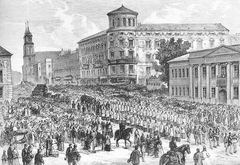Stanisław Moniuszko (1819-1872) on his 200th Birthday
Monday, April 29, 2019

May 5, 2019 marks the 200th birthday of Stanisław Moniuszko. As a composer, he is considered one of the founders of Polish music at a time when the Polish state had long since ceased to exist. He was born in Ubiel, near Minsk, as a member of the Polish aristocracy. As a child Moniuszko had private music lessons in Warsaw with Karl August Freyer. He studied composition from 1837 to1839 in Berlin at the Academy of Arts with Carl Friedrich Rungenhagen, received instruction in conducting, and found early success as a composer of songs. In 1839 he went to Vilnius, got married there, and found a position as an organist. In addition, Moniuszko organized a series of concerts in which he conducted and played.
From 1840 on, Moniuszko’s compositional activities intensified. He composed a large number of Polish songs and some cantatas. He continuously composed works for the stage and he is known as the father of Polish national opera. His first major opera was Halka. The premiere of the first version in two acts was directed by the composer in a concert performance in Vilnius on 1 January 1848. The second version, in four acts, was performed exactly ten years later in Warsaw.
In the same year, 1858, Stanisław Moniuszko and his family moved to Warsaw when he was appointed chief conductor of the Opera Narodowa. In his fifteen years there, he often brought his own works to the stage.
In 1864 he began to teach harmony, counterpoint, and composition at the Warsaw Conservatory, eventually being appointed professor of composition and music theory.
He died suddenly of a heart attack on 4 June 1872. The funeral procession through Warsaw turned into a patriotic mass demonstration (see image).
Everybody knows Stanisław Moniuszko’s name in Poland. Throughout the country, he is the namesake of parks, institutions, music groups, and music competitions. You can find his portrait on stamps and currency, and statues of him are everywhere. His works belong to the canon of Polish musical life and beyond. Moniuszko’s works have also been fostered intensively in Belarus since gaining independence in 1990.
The Warsaw Music Society, founded in 1871, was also named after Moniuszko. Its archives preserve a number of Moniuszko’s autograph music manuscripts, other musical sources of his compositions, and numerous letters. Cataloging this very important collection (RISM library siglum: PL-Wtm) has recently begun. It is part of our ongoing collaboration with the Chopin Institute in Warsaw. You can look forward to discovering more Moniuszko sources in RISM. We will keep you updated about this work.
Image courtesy of Marcin Konik (RISM Poland).
Share Tweet EmailCatégorie: Anniversaires

